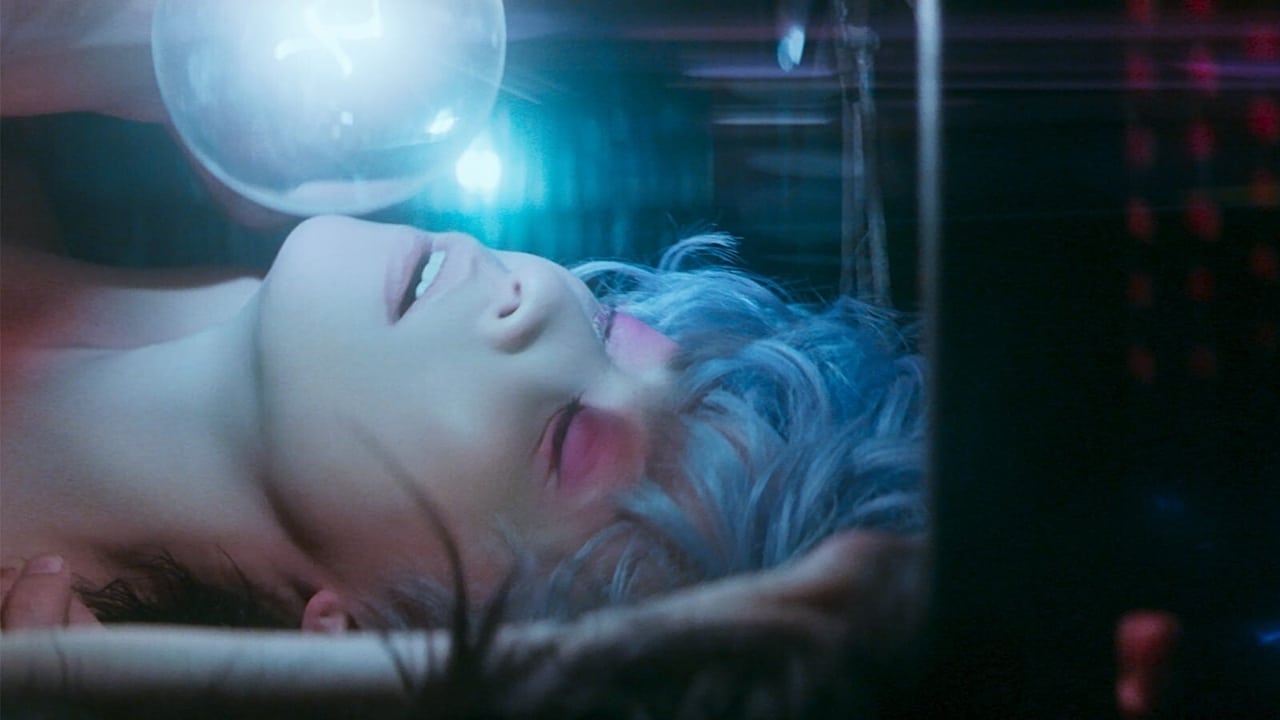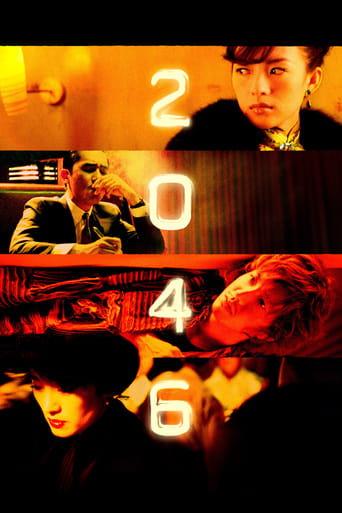

Excellent, Without a doubt!!
... View MoreExcellent, a Must See
... View MoreIt's hard to see any effort in the film. There's no comedy to speak of, no real drama and, worst of all.
... View MoreIt isn't all that great, actually. Really cheesy and very predicable of how certain scenes are gonna turn play out. However, I guess that's the charm of it all, because I would consider this one of my guilty pleasures.
... View MoreThis movie is supposed to be good but actually it was so boring I couldn't even finish it and I was so disappointed cause I was excited to watch something good this is not a good movie and Wong Kar Wai didn't do his even half of the best on it.
... View MoreA marvelous movie by Hong Kong director Kar Wai Wong, with an original script, innovative film narrative, wonderful characters and a super-stylish visuals. The movie depicts with realism, nostalgia and lyricism the difficulties and constrictions of the human heart, to love and being loved.It is a nostalgic view to the bygone loves of Tony Leung's, a part-time journalist and writer of romance novels, who lives in room 2047 in a hotel in Hong Kong. 2046 is the room where some of the stories happen, and also the title of Tony's sci-fi novel. The movie is the continuation of In the Mood for Love, and some references are directly related to the story in that movie.1/ The visuals The first thing that will catch your eye are the rich deep colors of the movie, especially the gorgeous reds and greens, but also the beautiful interior cinematography, the dresses, the make-up and hairdos, the colorful retro atmosphere and vintage texture of the film, the super-classy style of the film, in which even the smallest detail is taken care of.2/ The story Two main themes are explored in the film, love and literature. The movie tells several love stories, but they are not corny, as this movie is a reflection on real love - about how the past conditions our present relationships, about how love obsession can self-sabotage your emotional life, about those people who love us but we cannot love, and about the the importance of timing in love. Secondly, the movie depicts the process of literary creation, how our life and experiences affect our writing consciously or not, and how they are intricately mixed together.Tony's character is terrific so realistic and sophisticated at the same time, without all his human flaws well visible to the viewer. The women characters are quintessentially female but clever and powerful, but also drop dead gorgeous.3/ The narrative The narrative is circular but not straightforward as the different love stories are not chronologically told. The movie starts with one important story that happened in the past, and ends with the same story, as this story is the one that affected Tony's heart the most. Moreover, this circular and hopping movement is affected by the insertion of pieces of the present, in which Tony writes his novel 2046 and reflects about his past.The narrative breaks the love stories in different pieces, placing them according to the heart, not according to the time in which they occurred. This honors Tony' emotional memory, although emotional memories are never linear, and they are also affected by our present. Moreover, the way the story is told is intensely evocative and full of nostalgia, and really engaging from a mental point of view. I think that a linear script would have ruined the movie and had a soapy effect on the movie.4/ The acting Tony Leung Chiu Wai (as Tony Leung), Ziyi Zhang (as Bai Ling), and Faye Wong (as Wang Jing-wen and the android) are terrific in their performances, completely in tune with the needs of their characters. This is specially so in the case of y Ziyi Zhang, who looks ravishing beautiful but offers an unforgettable depiction of an emotionally multifaceted woman. One wonders why such a fine talented actress is doing crappy movies in Hollywood while she can really perform.Kar Wai Wong is a rare example of true artist, and this movie is a perfect example of that. I think the movie can be tricky for lazy watchers.
... View MoreWatching 2046 I now understand why I couldn't like In the Mood for Love. At first I thought it had something to do with WKW growing up, merely spectating in painterly detail what he used to rigorously throw himself at. I realize now I didn't like it because it's only the first part of Vertigo, where Judy is not yet Madeleine, a film in desperate search for its doppelganger by and to which it will become the mirror. It's the process by which a soul is clogged and haunted, 2046 on the other hand is the transcedental meditation, thoughts past and present coming and vanishing again until there is peace and the mind is empty. By the end of 2046 Tony Leung is no longer in the mood for love, he's ready for it and it'll never be too early or too late again.A friend whose taste I trust told me she didn't like 2046 because it was too vulgar, and there's a time when 2046 maybe is vulgar. There's a time in the film when Tony Leung is a prick. I thought we were seeing a Mr. Chow in name only, a sequel in the loose sense of the term. Mr. Chow is still the same though, merely thwarting through horrible behavior a situation that wound him in the past. I like how WKW sets him up for another unrequited love, with the same girl another love had remained unrequited in Chungking Express, but this is his chance to learn and eventually "that was the best summer he ever had". The sci-fi angle, where trains leave every hour for 2046 (the place of lost memories, from where no one comes back), is another mirror by which Mr. Chow can find himself, by which he can begin to acquiesce to the idea that sometimes you're not loved back because the other still loves someone else. At times, it seems even WKW is looking himself at that mirror to see or describe to himself what kind of movie he's making.The journey is very clear here, it could have been a very ordinary premise, the masterful touch being that we get inside the mind of the protagonist to experience the change like you can't experience a train moving until you get in one and look out the window. You can sit at the station and look at them go out every hour or you can sit at one and look at them arrive every hour but it's the existential middle of the process that makes the journey. In the end Mr. Chow remembers differently, he's not leaning on the shoulder of his old flame in that almost-b/w flashback shot, like a quintessential WKW character at film's end he's alone, but he's ready to be with others again. I like how the feelings experienced here are rendered with Cassavetian intimacy, how images hum with quiet intensity. I haven't seen My Blueberry Nights to see what he did next, but I feel WKW is still developing a language (one of the most interesting around for me) and I've great hopes because he's entry in To Each his Cinema is yet on another level. I was sorry to see WKW's marvelous visual vocabulary be reduced to the "slow tracking shot" in Mood for Love, here WKW picks it up again and he soars.
... View MoreHong Kong director Kar-Wai Wong's recent film 2046 is actually a continuation of the story he began in his 2001 art-house hit In the Mood for Love. Well, sort of, because while In the Mood had a fairly straightforward narrative everything in this new film is open to interpretation. Asian superstar Tony Leung is back as Chow Mo Wan but this is not the gentlemanly journalist we met in the first film. This Chow spends his days writing pulpy erotic fiction and his nights gambling, drinking and womanizing. In a voice-over narration Chow tells us about a sci-fi story he is working on. It's about a young Japanese man (Takuya Kimura) riding a train through time to 2046 where he hopes to recapture his lost memories and achieve emotional closure. The movie toggles back and forth between the writer's real life in 1960s Hong Kong and the futuristic fictional world of his imagination. Gradually Chow realizes he is writing about himself. Like his affair with carnal next door neighbour Bai (Crouching Tiger/Flying Daggers martial arts babe Ziyi Zhang as you have never seen her before), his unspoken feelings for Jing Wen (Faye Wong), the landlord's lonely young daughter and his liaison with an inscrutable lady gambler dubbed the Black Spider (Li Gong). None of these relationships last. "Why can't it be like it was before?" asks a heartbroken Bai and those words stay with him as he walks away because the women he meets in real life will never be able to measure up to the idealized perfection of the lost love who lives on in his memory. And so, like the character in his story, Chow will keep on travelling towards a place that only exists in his mind. If this sounds confusing you're not alone. "Actually we don't have an idea of what the story is about," Leung tells a French TV interviewer in a DVD featurette. Wong's films are not noted for their crisp linear plotting. He is all about mood, atmosphere and emotion. The camera-work is almost voyeuristic, shooting through windows, peering through peepholes, catching reflections in a mirror. The pace is languid, almost dream-like, the music on the soundtrack suffused with a gorgeous melancholy. A bittersweet sense of regret lingers in the eyes of these characters, like smoke curling lazily from a cigarette, creating an aura of sensual intrigue. Call it romantic noir. Some reviewers has likened Wong to a modern day Asian equivalent of the late great Federico Fellini and if that sounds appealing this may be the flavor you have been missing.But be warned: like many foreign delicacies this film can be an acquired taste.
... View More